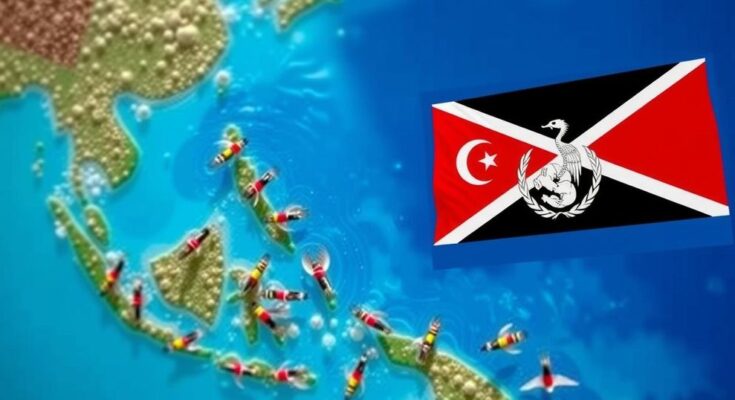Papua New Guinea has decided to boycott COP29, denouncing it as a ‘waste of time’ due to ineffective promises from major polluters. Foreign Minister Justin Tkatchenko criticized the lack of significant outcomes from past summits and signaled a shift towards bilateral negotiations with like-minded nations. This decision reflects growing discontent among smaller nations regarding international climate talks and a desire for more actionable commitments.
Papua New Guinea has announced its decision to boycott the upcoming UN climate summit, labeling it a substantial “waste of time” filled with ineffective promises from major polluting nations. The nation’s Foreign Minister, Justin Tkatchenko, emphasized the futility of attending the summit, noting that the ongoing negotiations fail to yield any significant results and often leave participants disillusioned. He criticized the dominant role of large polluters in climate discussions, asserting that their commitments often translate into mere consultant fees rather than tangible aid for climate relief. Characterized by one of the world’s largest rainforests, Papua New Guinea is severely impacted by climate change and naturally accumulated emissions from more developed nations. During his remarks, Minister Tkatchenko expressed the frustration felt by vulnerable nations, highlighting the lack of responsive action against climate threats. He stated, “COP is a total waste of time. We are sick of the rhetoric as well as the merry-go-round of getting absolutely nothing done over the last three years.” In a significant shift, the country plans to pursue bilateral negotiations with nations like Singapore instead of engaging in the COP talks. Papua New Guinea’s stance reflects a growing skepticism towards international climate discussions, where previous summits have drawn ire for inadequate actions against climate obligations. Recent critiques assert that adaptation funding for developing countries is hindered by bureaucratic sluggishness, failing to meet urgent needs. Although the UN Paris Agreement of 2015 set ambitious goals, subsequent meetings have been mired in controversies, casting doubt on the efficacy of such gatherings. Moreover, the move to boycott COP29 resonates within the Pacific community, echoing the sentiments shared by smaller nations facing existential threats from climate changes. As Minister Tkatchenko clearly articulated, the decision stems from a need for more effective and meaningful engagements that yield genuine progress towards climate justice, stating, “With like-minded countries like Singapore, we can do 100 times more than COP.”
Papua New Guinea’s announcement to boycott the upcoming COP29 summit underscores widespread disillusionment among smaller nations around the global climate negotiations. With climate change considerations at the forefront for many island states, the decision reflects both a call for meaningful action and accountability from larger, polluting nations. Historically, COP summits have struggled with concrete results, often leading to fallout due to perceived ineffectiveness. Papua New Guinea’s rich biodiversity and forests position it as a significant player in global climate dialogues, even as it faces grave vulnerabilities from climate change and rising sea levels.
In conclusion, Papua New Guinea’s decision to boycott the upcoming COP29 summit represents a critical commentary on the effectiveness of international climate negotiations. The country’s frustrations echo those of many smaller nations, advocating for more substantial and actionable commitments from major polluters. By choosing to pursue bilateral climate agreements, Papua New Guinea hopes to foster partnerships that will better address its climate challenges and ensure its voice is heard beyond the traditional avenues of dialogue.
Original Source: www.independent.co.ug




